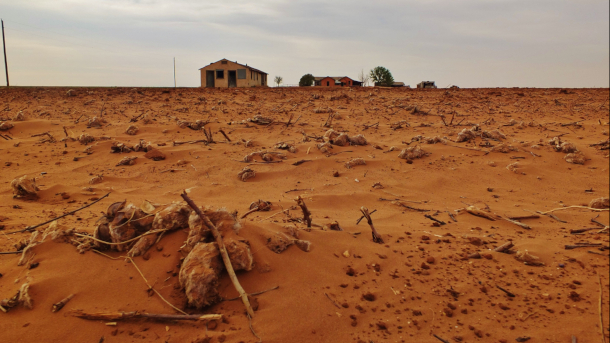Finance and Climate Denial
Air Date: Week of July 21, 2023

A new report from the U.K. finds that the financial sector often underestimates the potential economic harm that climate change could cause. (Photo: Josh Appel, Unsplash, Unsplash License)
The financial sector isn’t taking likely climate impacts like moderate sea level rise into account when it calculates risks to assets, according to a report. That leaves retirement accounts and pensions vulnerable in a warming world. Inside Climate News reporter Dan Gearino joins Host Aynsley O’Neill to explain the findings.
Transcript
CURWOOD: It’s Living on Earth, I’m Steve Curwood.
O’NEILL: And I’m Aynsley O’Neill.
As the planet continues to warm, there are numerous consequences for everything from Arctic permafrost to coastal real estate. But a report from the University of Exeter and the Institute and Faculty of Actuaries in the U.K. finds that the financial sector isn’t taking likely climate impacts into account. For example, one model looked at global GDP losses in a world of disastrous 3 degrees Celsius warming, which is double what scientists say is probably manageable for human civilization. But that model did not even include “impacts related to extreme weather, sea level rise or wider societal impacts from migration or conflict.” And that could make accurate financial planning difficult, if not impossible. Here to tell us more about these findings is Dan Gearino, who covers clean energy for our media partner Inside Climate News. Welcome to Living on Earth, Dan!
GEARINO: Good to be here.
O'NEILL: First, let's talk about some of the main takeaways here. What are the authors arguing in their report?
GEARINO: They're saying that a big problem exists with our ability to model the financial effects of climate change. Not only our ability to model this and our ability to make estimates, but also the willingness of financial firms to actually do something with that information and to seek out accurate information. A big part of that is how you account for climate tipping points, you know, these moments where things just leap in terms of their significance, both financially and environmentally. To read this report, you've got this entire array of financial institutions that are just not ready for what's ahead. And therefore, the people that they serve are maybe not feeling a sense of urgency to do something about climate change, because of this.

The report’s authors say the economic models used to forecast risk are ill-suited for investigating the effects of climate change on the financial system. (Photo: Nicholas Cappello, Unsplash, Unsplash License)
O'NEILL: And what do the authors of this report say about why these underestimates might be happening?
GEARINO: So, a big problem is economic modeling itself, this idea of taking variables, taking data we have based on past performance, and estimating what's going to happen in the future. The ways in which some economic models were produced in the past are not super useful for dealing with something like climate change. Just the act of quantifying things is really difficult when you're dealing with unprecedented circumstances.
O'NEILL: And now, you mentioned some tipping points. Are there specific tipping points that people are pointing to that might be affecting the financial sector?
GEARINO: Tipping points can be good and bad. You can reach tipping points where things get significantly better or significantly worse. But when we talk about financial risk, we're mainly talking about those downside tipping points, like massive crop failures. And when we talk purely in terms of climate tipping points, it's this idea of, once we reach a certain point, the negative effects increase substantially. And this has an effect across the economy, but then, kind of figuring out what that effect specifically is going to be is really challenging. You don't want to just throw your hands up and say, 'Oh, we don't know, it's probably going to be really bad.' You know, it's like, that's not super useful. What this report is saying is that, when faced with this challenging set of questions, the people who manage these firms and the people who produce economic models have erred on the side of underestimating the harm.

Economic models, the authors say, often leave out major climate hazards like sea level rise. (Photo: Chris Amelung, Flickr, CC BY 2.0)
O'NEILL: We've been talking about the financial sector and their underestimations. But what does underestimating the cost of climate change mean for the average person in their day to day lives?
GEARINO: A good example is retirement funds. So, you look at, like, your 401(k). Most 401(k) programs will give you an estimate of how much your expected income will be at a certain age based on modeling software, essentially. They basically are saying that, using their investment approach and using past performance, this is where you can expect to be when you're 65 years old. But what if 10 years from now, there are global economic events that are harmful to vast swaths of the economy? Then that means that that's something that my 401(k) is not taking into account. It's the potential for climate change-related economic harm to substantially increase, almost with each passing year, is something that is not accounted for.
O'NEILL: And in your reporting, you spoke with an economist at Columbia University who wasn't involved in the report that you're reporting on as a whole. And they mentioned that some experts have been warning about the financial risks of climate change for a pretty long time at this point. So, why aren't those concerns more front-and-center in the finance industry? Why hasn't it been changed already?
GEARINO: So, you're talking about Gernot Wagner, who is an economist at Columbia, and I asked him about this report. And one of the things he said is, 'Well, yeah, I've been talking about this for decades, and there are other economists who have been talking about this for a long time.' So, it's not that financial firms haven't been hearing this. But it's almost a question of, kind of, who do you choose to listen to, and how much weight do you put on the various information inputs you're getting if you're a financial firm? So, I think if you're an economist who's been talking about the financial risk of climate change for a long time, it can be frustrating to hear this being talked about as if it's a new idea, because it's not a new idea. What's new is the volume is really being turned up. It's like the, kind of, the level of emergency is higher than it was before.

The authors argue that financial firms should evaluate the risk of future scenarios that involve a “cascading” set of hazards —from extreme weather to food shortages, for instance. Above, drought parches a field in Texas. (Photo: National Oceanic and Atmospheric Administration, Public Domain)
O'NEILL: So, where do we go from here? We just work on fixing up those models and we're off to the races, or what are the next steps?
GEARINO: So, in the short term, this organization that issued this report, like, they would like pension funds in the U.K. to use better models. So they're trying to kind of move the needle locally, to make it so that those who really downplay climate risks and are relying on models that have low estimates for climate risk, that those can kind of be pushed aside in favor of models that are going to give more credence to the idea of tipping points, potentially, increasing financial risks substantially. But there's a larger issue, which is just the whole global financial system, you know, and this need to estimate what climate change might do to all of the assets, all the major assets we have, whether it be our retirement funds, whether it be our houses, whether it be, you know, just about anything. I think that this report from the U.K. is a good opportunity to talk about that larger set of concerns.
O'NEILL: Well, so yes, the report is from the U.K. What are you seeing more globally on this front, you know, in the U.S. and elsewhere?
GEARINO: There are a variety of attempts to require companies to disclose the climate risks. There are attempts to do that at the state level, there's attempts to do that through financial regulators. Disclosing your climate risks is only part of the challenge. You also need to make sure those disclosures are accurate and are based on reliable information. But there are versions of this same discussion happening in the United States. And you're seeing more of this in states that have been more, kind of, ahead of the curve in dealing with climate change. It's ultimately, though, something that, you know, any shareholder should be concerned about. I think you're going to see this increasing kind of volume, kind of just turning the volume up on this discussion and trying to make it so that we have a better idea of what, you know, what the future might look like. What that means, though, I mean, that's going to be a frustrating level of uncertainty because you have this wide variety of outcomes. We don't know which one we're going to get. And a lot of that depends on actions that we're taking right now, in terms of policy, in terms of reducing emissions, and to truly grasp with that level of uncertainty and just how unsettled a moment we are in right now, it can be frightening, but I think that that's where this conversation needs to head.
O'NEILL: Dan Gearino is a reporter for Inside Climate News. Dan, thanks so much for speaking with us today.
GEARINO: Thanks for having me.
Links
Read the report from the Institute and Faculty of Actuaries and the University of Exeter
Read more about how climate change could affect the U.S. financial system
Living on Earth wants to hear from you!
Living on Earth
62 Calef Highway, Suite 212
Lee, NH 03861
Telephone: 617-287-4121
E-mail: comments@loe.org
Newsletter [Click here]
Donate to Living on Earth!
Living on Earth is an independent media program and relies entirely on contributions from listeners and institutions supporting public service. Please donate now to preserve an independent environmental voice.
NewsletterLiving on Earth offers a weekly delivery of the show's rundown to your mailbox. Sign up for our newsletter today!
 Sailors For The Sea: Be the change you want to sea.
Sailors For The Sea: Be the change you want to sea.
 The Grantham Foundation for the Protection of the Environment: Committed to protecting and improving the health of the global environment.
The Grantham Foundation for the Protection of the Environment: Committed to protecting and improving the health of the global environment.
 Contribute to Living on Earth and receive, as our gift to you, an archival print of one of Mark Seth Lender's extraordinary wildlife photographs. Follow the link to see Mark's current collection of photographs.
Contribute to Living on Earth and receive, as our gift to you, an archival print of one of Mark Seth Lender's extraordinary wildlife photographs. Follow the link to see Mark's current collection of photographs.
 Buy a signed copy of Mark Seth Lender's book Smeagull the Seagull & support Living on Earth
Buy a signed copy of Mark Seth Lender's book Smeagull the Seagull & support Living on Earth

